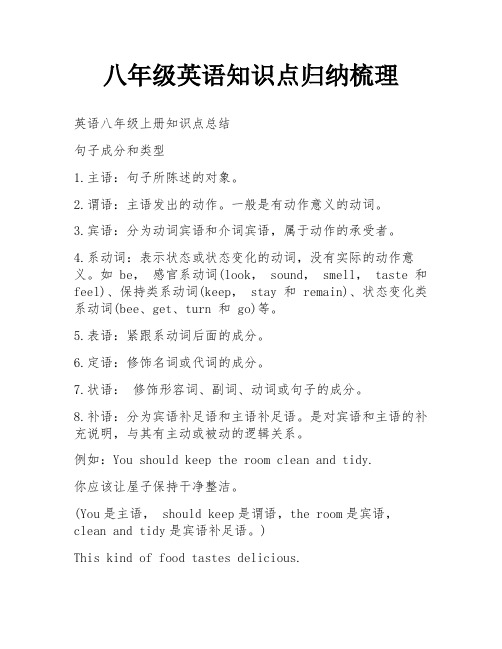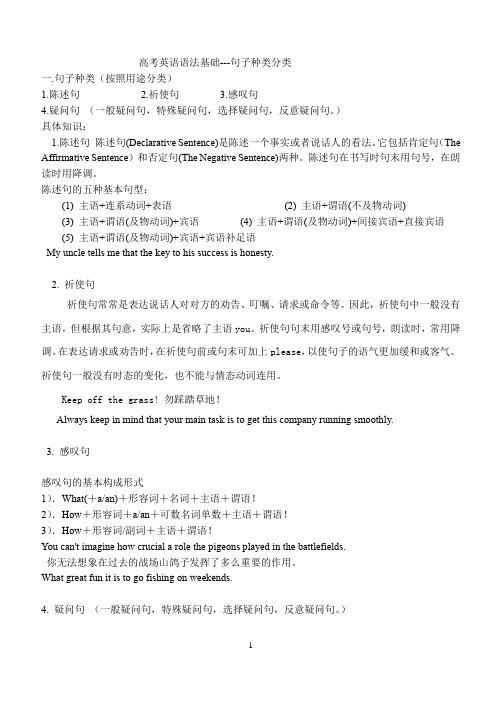句子成分及基本类型(知识梳理)
句子成分归纳总结句子成分的分类方法

句子成分归纳总结句子成分的分类方法句子是语言交流的基本单位,它由各种句子成分组成。
通过对句子成分的分类和归纳总结,可以更好地理解句子的结构和语法规则。
本文将介绍几种常见的句子成分分类方法,包括主语、谓语、宾语、表语、状语和定语。
一、主语主语是句子的核心成分,它通常是一个名词、代词或名词短语,用来表示句子所述的主体。
主语一般位于谓语动词前面,回答“谁?”的问题。
例如:- 孩子们在公园里玩耍。
(孩子们是主语)- 他是一名医生。
(他是主语)二、谓语谓语是句子中表示动作或状态的核心成分,常常是一个动词。
它和主语一起构成句子的谓语部分,表示主语所做的动作或所处的状态。
谓语回答“做什么?”的问题。
例如:- 我喜欢看电影。
(喜欢是谓语)- 他正在写作业。
(正在写是谓语)三、宾语宾语是句子中与谓语动词相对应的成分,表示动作的承受者或影响者。
宾语通常是一个名词、代词或名词短语。
宾语回答“干什么?”的问题。
例如:- 我们吃了一顿丰盛的晚餐。
(一顿丰盛的晚餐是宾语)- 她看见了一只小鸟。
(一只小鸟是宾语)四、表语表语是句子中用来说明主语的性质、状态、特征等的成分。
表语通常是一个形容词、名词或名词短语。
表语位于系动词之后,与系动词构成句子的谓语部分。
例如:- 那个男孩很聪明。
(很聪明是表语)- 妈妈是一位教师。
(一位教师是表语)五、状语状语是句子中用来修饰动词、形容词、副词或整个句子的成分,用来表示时间、地点、方式、原因等。
状语可以是单个词、短语或从句。
例如:- 我们明天去旅行。
(明天是状语)- 他用功地学习。
(用功地是状语)六、定语定语是句子中修饰名词或代词的成分,用来描述名词或代词的性质、特征等。
定语可以是单个词、短语或从句。
例如:- 这本书非常有趣。
(这本是定语)- 她戴着一顶红色的帽子。
(一顶红色的是定语)通过对以上句子成分的分类和归纳总结,我们可以更好地理解句子的结构和语法规则,从而提高自己的语言表达能力。
在写作、阅读和理解句子时,对句子成分的准确分类和分析将有助于我们把握句子的意思和表达方式。
九大成分,基本句子类型

句法1、九大句子成分:一、主语(Subject):表示句子说的是什么人或什么事。
1. During the 1990s, American country music has become more and more popular.2. We often speak English in class.3. To swim in the river is a great pleasure.4. Smoking does harm to the health.5. When we are going to have an English test has not been decided.6. It is necessary to master a foreign language.二、谓语(Predicate):说明主语所做的动作或具有的特征和状态。
动词在句中作谓语,一般放在主语之后。
1. He practices running every morning.2. The plane took off at ten o’clock.3. Do you speak English?4. They are working in a field.5. He has caught a bad cold.三、表语(Predicative):用以说明主语的性质、特征、状态与身份,它一般位于系动词之后。
系动词:1)状态系动词用来表示主语状态,只有be一词,例如:He is a teacher.2)持续系动词用来表示主语继续或保持一种状况或态度,主要有keep, remain, stay, lie, stand, 例如:He always kept silent at meeting.3)感官系动词主要有feel, smell, sound, taste, 例如:This kind of cloth feels very soft.4)变化系动词表示主语变成什么样,主要有become, grow, turn, fall, get, go, come, run.例如:The river was beginning to run dry.1. Our teacher of English is an American.2. It sounds good.3. The weather has turned cold.4. Your dreams come true.5. He became a good doctor.四、宾语(Object):表示动作的对象或承爱者,一般位于及物动词和介词后面。
句子成分的种类与功能总结

句子成分的种类与功能总结在语言学中,句子是最基本的语言单位,由不同的句子成分组成。
这些句子成分在句子中扮演着不同的角色,有着各自独特的功能。
通过对句子成分的分类和功能的总结,我们可以更好地理解句子的结构和意义。
一、名词性成分1. 主语:句子的主题,通常是由名词、代词或名词短语作为其核心。
2. 谓语:句子的核心,表示主语的动作、状态或属性。
可以是及物动词、不及物动词、连系动词等。
3. 宾语:接在及物动词后面,表示动作的承受者或作用对象。
通常是名词或代词。
4. 补语:补充说明主语或宾语的属性、状态或特征。
可以是形容词、名词、动词不定式、副词等。
二、状语1. 地点状语:表示动作发生的地点或范围。
2. 时间状语:表示动作发生的时间或时间段。
3. 方式状语:表示动作的方式、方式或手段。
4. 原因状语:表示动作的原因或理由。
5. 目的状语:表示动作的目的或意图。
6. 结果状语:表示动作的结果或后果。
7. 条件状语:表示动作发生的条件。
8. 比较状语:表示动作的程度、程度或大小的比较。
三、定语1. 形容词:修饰名词或代词,表示其属性、性质或特征。
2. 限定词:修饰名词,确定其数量、身份或范围。
例如:数词、冠词、指示代词等。
3. 关系词:引导定语从句,修饰名词,进一步说明其身份、特点或关系。
四、独立成分1. 独立主格:由名词(或代词)和非谓语动词(一般是现在分词或过去分词形式)构成,表示与主句中的主语或宾语并行的另一动作或情况。
2. 独立结构:包括独立主格、独立句和独立分句。
可以独立存在,不影响主句的结构和意义。
五、补充成分1. 插入语:用于在句子中插入补充、解释或陈述附加信息。
一般用逗号、括号或破折号包围。
2. 状语从句:由连词引导的从句,用来修饰句子中的动词、形容词或副词。
3. 定语从句:由关系代词或关系副词引导的从句,用来修饰名词或代词。
综上所述,句子成分的种类与功能多种多样,每个成分都在句子中扮演着不可或缺的角色。
八年级英语知识点归纳梳理

八年级英语知识点归纳梳理英语八年级上册知识点总结句子成分和类型1.主语:句子所陈述的对象。
2.谓语:主语发出的动作。
一般是有动作意义的动词。
3.宾语:分为动词宾语和介词宾语,属于动作的承受者。
4.系动词:表示状态或状态变化的动词,没有实际的动作意义。
如 be,感官系动词(look, sound, smell, taste 和feel)、保持类系动词(keep, stay 和 remain)、状态变化类系动词(bee、get、turn 和 go)等。
5.表语:紧跟系动词后面的成分。
6.定语:修饰名词或代词的成分。
7.状语:修饰形容词、副词、动词或句子的成分。
8.补语:分为宾语补足语和主语补足语。
是对宾语和主语的补充说明,与其有主动或被动的逻辑关系。
例如:You should keep the room clean and tidy.你应该让屋子保持干净整洁。
(You是主语, should keep是谓语,the room是宾语,clean and tidy是宾语补足语。
)This kind of food tastes delicious.这种食物吃起来很可口。
(This kind of food是主语, tastes是系动词, delicious 是表语。
)注意:主语、谓语、宾语、系动词、表语、补语是一个句子的主干成分;定语和状语是一个句子的修饰性成分,不是主干成分。
9.简单句的基本形式是由一个主语加一个谓语构成。
10.复合句由一个主句和一个或一个以上的从句构成。
11.两个或两个以上的简单句用并列连词连在一起构成的句子,叫做并列句,其基本结构是“简单句+并列连词+简单句”。
八年级上册英语期中知识点总结1. It takes sb. some time to do sth. 花费某人某些时间去做某事,例如:It takes me twenty minutes to get to school on foot every morning.每天早晨我步行到学校要花费二十分钟。
英语句子成分和基本句型(PDF版)

表:
动词分类
动词分类 1
动词分类 2
1、 不及物动词
1、不带宾语的动词
2、带一个宾语的及物动词
2、及物动词
3、带两个宾语的及物动词
4、带宾语和宾语补足语的及物动词
3、连系动词
5、带主语补足语(表语)的动词
从本表中我们看到,动词可以分为五类,因而就决定了英语的五种基本句型。英语的五种基本句型与上述动 词分
基本句型一:S+ V(主+谓)
S│V(不及物动词)
1.
Thesun│isshining.
2.Theboy│getsup.3.Weall│eat,anddrink.
主语可有修饰语-定语,谓语可有修饰语-状语。
如:1.Theredsunrisesintheeast.
2.Wegotupearlysoastocatchthefirstbus.
19.Ifoundthebookeasy. 20.Tom foundJim anapartment 21.WefoundJohnaloyal(忠心的)friend.
【课后强化巩固练习】
判断下列句子属于何种句型并翻译成汉语:
1.Iusuallycometoschoolbysubway. 2.Yournewbikelooksverynice! 3.Theearlybirdcatchestheworm. 4.Heusuallyplayssoccer,buthedoesn’tplaybasketball. 5.I’m makingcards,butit’sboring. 6.Theyaredoingsomecleaninginthelab. 7.IthinkyoumustlikeEnglishverymuch. 8.Myfavoritesubjectishistory. 9.Myteachersandclassmatesareverykindtome. 10.Thereisastudynexttomybedroom. 11.Don’tputthemthere. 12.Youmustlookafteryourthings. 13.Manyfamilywithyoungchildrenlivehere,too. 14.Theairisfreshandlifeisquietinthecountryside. 15.Myfriendswanttohaveabirthdaypartyforme. 16.ItwasMay13th. 17.Icancook,butIcan’tdrawpictures. 18.I’dliketotaketheseflowerstotheparty. 19.Ican’tcountsomanyflowers. 20.Shecandoitverywell. 21.Oneyearago,shecouldn’tdoitatall. 22.Webroughtmanypresentsforhim. 23.EachofusgaveKangkangabirthdaycard. 24.It’sagoodseasonforflyingkite. 25.You’dbetterknowabouttheweatherindifferentplacesinAugust. 26.InmostareasofChina,itisveryhot. 27.Isawyouplaybasketballalmosteverydayduringthesummerholidays. 28.Shedoeswellin(playing)baseball. 29.I’m sureourteam willwinnexttime. 30..Heinventedanindoorgameforhisstudentssothattheycouldplayiteveninbadweather.
高考英语语法句子类型及句子成分基础知识

高考英语语法基础---句子种类分类一.句子种类(按照用途分类)1.陈述句2.祈使句3.感叹句4.疑问句(一般疑问句,特殊疑问句,选择疑问句,反意疑问句。
)具体知识:1.陈述句陈述句(Declarative Sentence)是陈述一个事实或者说话人的看法。
它包括肯定句(The Affirmative Sentence)和否定句(The Negative Sentence)两种。
陈述句在书写时句末用句号,在朗读时用降调。
陈述句的五种基本句型:(1) 主语+连系动词+表语(2) 主语+谓语(不及物动词)(3) 主语+谓语(及物动词)+宾语(4) 主语+谓语(及物动词)+间接宾语+直接宾语(5) 主语+谓语(及物动词)+宾语+宾语补足语My uncle tells me that the key to his success is honesty.2. 祈使句祈使句常常是表达说话人对对方的劝告、叮嘱、请求或命令等。
因此,祈使句中一般没有主语,但根据其句意,实际上是省略了主语you。
祈使句句末用感叹号或句号,朗读时,常用降调。
在表达请求或劝告时,在祈使句前或句末可加上please,以使句子的语气更加缓和或客气。
祈使句一般没有时态的变化,也不能与情态动词连用。
Keep off the grass! 勿踩踏草地!Always keep in mind that your main task is to get this company running smoothly.3. 感叹句感叹句的基本构成形式1).What(+a/an)+形容词+名词+主语+谓语!2).How+形容词+a/an+可数名词单数+主语+谓语!3).How+形容词/副词+主语+谓语!You can't imagine how crucial a role the pigeons played in the battlefields.你无法想象在过去的战场山鸽子发挥了多么重要的作用。
英语句子结构详细讲解
英语句子结构详细讲解一.句子成分分析1.主语(subject)句子的主体,全句述说的对象。
一般由名词,代词,数词,不定式,动名词,从句担任,常置于句首。
(名词)(主格代词)(数词)(不定式)(动名词)(主语从句)2. 谓语(predicate)对主语加以陈述,表示主语的行为或状态,常用动词或者动词词组担任,放在主语的后面。
谓语分为简单谓语和复合谓语(1).简单谓语由一个动词或者动词短语构成at 6 o?clock.(动词)(动词短语)(2).复合谓语①由情态动词或其他助动词加动词原形构成(情态动词+动词原形)She (助动词do+动词原形)(助动词has+动词原形)补充:协助主要动词构成谓语动词词组的词叫助动词(Auxiliary Verb)。
被协助的动词称作主要动词(Main Verb)。
最常用的助动词有:be, do, have, shall, will, should, would. 助动词自身没有词义,不可单独使用,例如:He doesn't like English. 他不喜欢英语。
(doesn't是助动词,无词义;like是主要动词,有词义)②由系动词加表语构成(即主系表结构)(状态系动词be+表语)(表象系动词look+表语)补充:系动词亦称联系动词(Link Verb),作为系动词。
有些不具词义;有些具有词义,但不能单独用作谓语,后边必须跟表语(亦称补语),构成系表结构说明主语的状况、性质、特征等情况。
1.状态系动词用来表示主语状态,只有be一词,例如:He is a teacher. 他是一名教师。
(is与补足语一起说明主语的身份。
)2.持续系动词用来表示主语继续或保持一种状况或态度,主要有keep, rest, stay, lie, remain, 例如:He always kept silent at meeting. 他开会时总保持沉默。
This matter rests a mystery. 此事仍是一个谜。
高考英语语法句子类型及句子成分基础知识点
高考英语语法基础---句子种类分类一.句子种类(按照用途分类)1.陈述句2.祈使句3.感叹句4.疑问句(一般疑问句,特殊疑问句,选择疑问句,反意疑问句。
)具体知识:1.陈述句陈述句(Declarative Sentence)是陈述一个事实或者说话人的看法。
它包括肯定句(The Affirmative Sentence)和否定句(The Negative Sentence)两种。
陈述句在书写时句末用句号,在朗读时用降调。
陈述句的五种基本句型:(1) 主语+连系动词+表语(2) 主语+谓语(不及物动词)(3) 主语+谓语(及物动词)+宾语(4) 主语+谓语(及物动词)+间接宾语+直接宾语(5) 主语+谓语(及物动词)+宾语+宾语补足语My uncle tells me that the key to his success is honesty.2. 祈使句祈使句常常是表达说话人对对方的劝告、叮嘱、请求或命令等。
因此,祈使句中一般没有主语,但根据其句意,实际上是省略了主语you。
祈使句句末用感叹号或句号,朗读时,常用降调。
在表达请求或劝告时,在祈使句前或句末可加上please,以使句子的语气更加缓和或客气。
祈使句一般没有时态的变化,也不能与情态动词连用。
Keep off the grass! 勿踩踏草地!Always keep in mind that your main task is to get this company running smoothly.3. 感叹句感叹句的基本构成形式1).What(+a/an)+形容词+名词+主语+谓语!2).How+形容词+a/an+可数名词单数+主语+谓语!3).How+形容词/副词+主语+谓语!You can't imagine how crucial a role the pigeons played in the battlefields.你无法想象在过去的战场山鸽子发挥了多么重要的作用。
语文基础知识之句子成分分析
语文基础知识之句子成分分析杜娟一)知识要点1什么是句子句子是由词或词组构成的,是具有一定语调并表达一个完整意思的语言运用单位。
根据用途和语气,句子可以分为陈述句、疑问句、祈使句、感叹句。
根据结构可分为单句和复句。
我们今天要研究的是单句,要给它划分成分。
2.句子成分的名称及符号名称:主语、谓语、宾语、定语、状语、补语。
符号:主语 = 谓语-宾语~定语()状语 [ ] 补语 < >①句子的基本成分是:主语、谓语、宾语。
补充成分是:定语、状语、补语。
②主语部分和谓语部分之间可用‖划开。
3.(1)划分句子成分,首先要研究主语、谓语、宾语。
主语:是谓语陈述的对象,指明说的是“什么人”或“什么事物”。
谓语:是陈述主语,说明主语的,说明主语“是什么”或“怎么样”。
宾语:在动词后面,表示动作、行为所涉及的人或事物,回答“谁”或“什么”一类问题。
句子一般有两种情况:写人、写物(写事、写物)。
分析句子时,首先判断是“写人”还是“写物”。
①.写人格式:“谁”+“干什么”(主语)(谓语)(宾语)例:杨亚‖写字主谓宾注意:处理复杂的单句时,要抓主干。
例:一中的杨亚║在课桌上写着毛笔字。
主谓宾②.写物格式:“什么事”或“什么物”+“怎么样”(主语)(谓语、宾语)例:猫‖捉鱼主谓宾例:一只小猫‖在盆边捉了一条大鱼主谓宾注意:“是”为典型的动词,一般是“谓语”。
例如:他‖是学生主谓宾(2).划分句子成分,还要抓住枝干(定语、状语、补语)定语:在句子中起着修饰、限制主语或宾语中心语的作用。
状语:修饰、限制谓语中心语,一般在谓语中心语前面,有的在句子最前面,交待时间、地点、范围、情况等。
补语:对谓语中心语起补充说明作用,一般放在谓语中心语之后。
例:画眉唱歌这是一个把主语中心语、谓语中心语、宾语中心语单提出的句子。
原句是“两只美丽的画眉高兴地唱一首歌。
”①.(两只美丽的)画眉“两只美丽”是“画眉”--主语中心语的修饰部分,叫“定语”。
句子成分知识点总结大全
句子成分知识点总结大全在学习语文的过程中,句子成分是一个重要的知识点。
深入了解和掌握句子成分的概念、种类和功能对于提高语文表达能力和写作水平具有重要意义。
本文将对句子成分的相关知识进行全面总结,帮助读者更好地理解和运用。
一、句子成分的概念句子成分是指构成和组成句子的基本要素,主要分为句子核心成分和句子修饰成分。
句子核心成分通常包括主语和谓语,而句子修饰成分则包括定语、状语和补语等。
主语:指句子中动作的承受者或实施者,常常回答“谁”或“什么”。
谓语:指句子中说明主语具体动作或状态的部分,常常回答“做什么”或“是什么”。
二、句子成分的种类1. 主语主语是句子的核心成分之一,常常回答“谁”或“什么”。
主语可以是一个名词、代词、数词、不定代词等。
例如:- 他是一位优秀的学生。
- 这只小猫很可爱。
2. 谓语谓语是句子的核心成分之一,用来说明主语的动作或状态。
谓语可以是及物动词、不及物动词、系动词、助动词等。
例如:- 我喜欢看电影。
- 小花跑得很快。
3. 定语定语是句子中修饰名词或代词的成分,用来限定或描述名词或代词的特征。
定语可以是形容词、名词、动词、副词、介词短语等。
例如:- 高大的建筑物令人印象深刻。
- 这本有趣的故事书是我的最爱。
4. 状语状语是句子中表示时间、地点、原因、方式、程度等信息的成分,用来修饰动词、形容词、副词或整个句子。
状语可以是副词、介词短语、动词短语、形容词等。
例如:- 昨天我在公园里见到他。
- 他认真地做完了作业。
5. 宾语宾语是句子中受到动作影响的人或事物,常常回答“谁”或“什么”。
宾语可以是名词、代词、数词等。
例如:- 他喜欢听音乐。
- 我买了一本新书。
6. 补语补语是句子中用来补充说明主语或宾语的成分,常常回答“是什么”或“怎样”。
补语可以是形容词、名词、副词等。
例如:- 她是一位优秀的演员。
- 他的办公室很整洁。
三、句子成分的功能句子成分不仅分为不同的种类,还有不同的功能和作用。
- 1、下载文档前请自行甄别文档内容的完整性,平台不提供额外的编辑、内容补充、找答案等附加服务。
- 2、"仅部分预览"的文档,不可在线预览部分如存在完整性等问题,可反馈申请退款(可完整预览的文档不适用该条件!)。
- 3、如文档侵犯您的权益,请联系客服反馈,我们会尽快为您处理(人工客服工作时间:9:00-18:30)。
句子成分及基本类型真题再现 1. We live in an age ______ more information is available with greater ease than ever before. A. why B. when C. to whom D. on which 2. After the flooding, people were suffering in that area, _______ urgently needed clean water, medicine and shelter to survive. A. which A whatever A. how A. is there A. consider 答案与解析: 1. B。
分析从句成分, “主系表”结构完整, when 只能代替先行词(at) an age 在从句中做时间状语, 修饰先行词 an age(时代) 。
此处的 when=at which。
2. B。
在非限制性定语从句中缺主语, 只能用关系代词 who 代替先行词 people 在从句中作主语。
3. B。
所填词引导的从句做动词 choose 的宾语,引导词在从句中做主语,意思是“无论哪件”, 选 B。
C、D 选项只能在句中作状语, 题干中已有“five courses”,排除 A 项。
4. D。
此处 it 是形式主语,what 引导的是主语从句,作真正的主语。
What 作 do 的宾语。
句意: 总统采取什么行动结束这次罢工一点也不清楚。
5. A。
根据前面 there be 句里含有否定意义的词 little,所以反意疑问句用肯定形式,其主谓应 与陈述部分的主谓保持一致,故选 A 项。
6. A。
结合选项来分析句子结构,逗号前为时间状语从句,后面实际上是一个祈使句,缺少谓 语。
由此可知,A 选项符合题意。
B. who C. where B. whichever B. which D. what C. whenever C. that D. wherever D. what 3. As many five courses are provided, and you are free to choose ______ suits you best. 4. It is by no means clear the president can do to end the strike.5. There is little doubt in your mind that he is innocent, _______________? B. isn't there C. is he D. isn't he B. considering C. to consider D. considered 6. Before you quit your job, ______how your family would feel about your decision.知识讲解 句子成分的定义 构成句子的各个部分叫做句子成分。
句子成分有主要成分和次要成分;主要成分有主语和谓语; 次要成分有表语、宾语、定语、状语、补足语和同位语。
主语 表示句子所要说明或描述的人或事物,一般由名词、代词或相当于名词的词组或句子充当,置 于句首。
Walls have ears. 隔墙有耳。
(名词做主语) He will take you to the hospital. 他会带你去医院。
(代词做主语) Three plus four is seven. To see is to believe. 三加四等于七。
(数词做主语) 眼见为实。
(动词不定式做主语)Smoking is not allowed in public places. 公共场所不允许吸烟。
(动名词做主语) Whether or not they will come depends on the weather. 他们来不来取决于天气。
(从句做主语) 谓语 说明或描述主语的动作、状态或特征,由动词或动词短语充当,位于主语之后。
He practices running every morning. The plane took off at ten o’clock. 复合谓语: 由情态动词或其他助动词加动词原形构成。
You may keep the book for two weeks. He has caught a bad cold. 由系动词加表语构成。
We are students. 注意:谓语与主语在人称与数方面要保持一致。
表语 表示主语的身份、性质、状态和特征,一般由名词、形容词、或相当于名词、形容词的词、短 语或句子充当,位于连系动词之后,与连系动词一起构成句子的谓语。
Our teacher of English is an American.(名词) Is it yours? (代词) The weather has turned cold.(形容词) The speech is exciting.(分词) Three times seven is twenty-one? (数词) His job is to teach English.(不定式) His hobby is playing football.(动名词) The meeting is of great importance.(介词短语) Time is up. The class is over.(副词) The truth is that he has never been abroad.(表语从句) 注意:系动词用于连接主语和表语,说明主语的状态,性质特征和身份等。
状态系动词用来表示主语状态,只有 be 一词。
He is a teacher. 持续系动词用来表示主语继续或保持一种状况或态度,主要有 keep, rest, remain, stay, lie, stand.He always kept silent at meeting. 表像系动词用来表示“看起来像”这一概念,主要有 seem, appear, look. He seems (to be) very sad. 感官系动词主要有 feel, smell, sound, taste This kind of cloth feels very soft. 变化系动词表示主语变成什么样,主要有 become, grow, turn, fall, get, go, come, run The rumor proved false. His plan turned out a success. 宾语 宾语表示动作的对象或承受者,一般位于及物动词和介词后面。
She covered her face with her hands. 她用双手蒙住脸。
(名词短语作宾语) We haven't seen her for a long time. 我们好长时间没看到她了。
(代词作宾语) Do you mind opening the window? 打开窗户你介意吗?(动名词短语作宾语) Give me four please. 请给我四个。
(数词作宾语) He wants to dream a nice dream. 他想做一个好梦。
(动词不定式短语作宾语) We need to know what others are doing. 我们需要了解其他人都在干什么。
(从句作宾语) I lived in Japan in 1986. 我 1986 年住在日本。
(名词和数词作介词的宾语) 双宾语(间接宾语+直接宾语) Lend me your dictionary, please. 后接 to 的有:write, tell, pass, give, send, promise, show, hand, read, tell, bring, throw 等。
He sent the novel to William yesterday. 后接 for 的有:leave, buy, build, choose, cook, draw, find, get, order, post, save 等。
She bought a gift for her mother. 下列动词只能接不定式做宾语:ask, agree, care, choose, demand, dare, decide, expect, fail, help, hope, learn, manage, offer, plan, prepare, pretend, promise, refuse, want, wish, desire 等。
下列动词只能接动名词做宾语: admit, avoid, advise, consider, enjoy, excuse, escape, finish, imagine, mind, practise, suggest 等。
下列动词既可接不定式,也可接动名词做宾语,但意义不同:stop, mean, try, remember, forget, regret 等。
宾语补足语 用来对宾语进行补充和说明,一般由名词、非谓语动词、形容词等充当。
带有宾语补足语的一 般句型为:“某些及物动词(如 make 等)+宾语+宾补)”。
宾补可由名词、形容词、副词、不定 式、分词、介词短语,what 从句作宾补相当于名词。
His father named him Dongming. (名词)They painted their boat white. (形容词) Let the fresh air in. (副词) You mustn’t force him to lend his money to you. (不定式短语) We saw her entering the room. (分词短语) We found everything in the lab in good order. (介词短语) We will soon make our city what your city is now. (what 从句) 定语 对名词或代词进行修饰、限制或说明,一般由形容词、名词、代词、数词、介词短语、非谓语 动词及句子等充当,位置可在所修饰的词之前,也可在所修饰的词之后。
They are women workers.(名词作定语) Tom's father didn't write home until yesterday.(所有格名词作定语) Equal pay for equal work should be introduced.(形容词作定语) The play has three acts.(数词作定语) This is her first trip to Europe.(代词、数词和介词短语作定语) China is a developing country.(现在分词作定语) You haven't kept your promise to write us often.(动词不定式短语作定语) My cat has a good nose for milk.(介词短语作定语) Those who want to go to Tibet are to sign their names here.(从句作定语) 状语 用于修饰动词、形容词、副词、短语或整个句子等,一般由副词、介词短语、非谓语动词短语 或句子充当。
